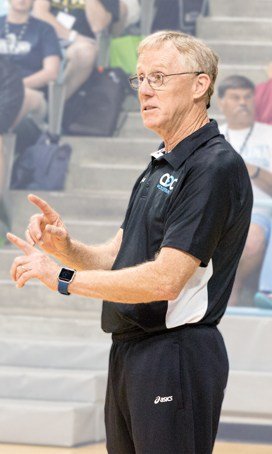By Priscilla Tallman

If you have an athlete who plays both club and school volleyball, you know that the 2 seasons can be very different. Here are 6 ways to encourage your athlete during both seasons so they get the most out of their sport year-round.
“Athletes at the school level really want to do well. There is a sense of pride to represent and do well for your school.” – Mike Lussier, freshman volleyball coach, Verrado High School and Club Director at AZ Epic.
Encourage school pride – School volleyball is a fantastic way to encourage local and community pride in your athlete. Your child’s school likely has a mascot, school colors and a variety of sports and extracurricular activities they can participate in and support during the year. Children represent not only their school but their community as a whole. Their participation in school sports can be a great starting point for a conversation about community outreach and how school sports can positively impact a community.
“In club you have more skill level teams 1’s, 2’s, etc... School programs are more developmental. You are teaching from the ground up in some cases.” – Mike Lussier
Learn from all levels of play – School-level athletics are markedly different than club sports. In fact, coaches are choosing their teams from a different pool of athletes for each one. In club sports, athletes come from around the city and from different schools and districts to form specific age and skill level teams (i.e. 14’s, 15’s, 1’s, 2’s). School teams consist of athletes from around your local neighborhoods and surrounding areas. Because of this difference, your child has the opportunity to play with athletes at all different skill levels during each season.
Stronger players in school or club settings can work on teamwork, attitude and leadership skills. Players looking to improve in either setting can work on goal setting and learning from more experienced and skilled players.
“The girls are playing on ‘probation’ in a sense. If you are failing, you don’t play. It is a motivation to pass and do well in sports.” – Mike Lussier
Teach academics as a priority – Coaches have standards in addition to school rules, but if you are failing a class in school ball, you don’t play. In club, it may be at the discretion of the parent, family and coach whether an athlete can continue to train despite a failing grade. Encourage your child to keep their grades up and set standards to meet during their season. This will help them in youth sports and also if they are on track to play at the collegiate level. Athletes with a good academic record have opportunities outside of sports once their careers are completed.
“There is a camaraderie [in school sports]. They see each other all the time; they are connected on and off the court. It’s more of a sisterhood.” – Mike Lussier
Promote sisterhood – School ball and club ball create different team dynamics. With school ball, you have a team that struggles on and off the court together. They may share the same classes, have tests the same day, ride the bus together and go to various school functions together. They have a special kind of sisterhood. In club, they don’t share school pressures in the same way, but there are similar bonding opportunities (e.g. most weekends together, road trips). Your children will likely encounter different temperaments and personalities within their teams. Help them to understand these dynamics and encourage healthy communication. Common courtesy and simple manners go a long way.
“It’s about managing the talent you have. It comes down to attitude and coachability.” – Mike Lussier
Nurture respect for your leaders – Whether it’s club or school volleyball, teach your children to respect their coaches and coaching staff. Decisions that are made at the school level can be very different than decisions made at the club level regarding playing time, choice of team captains, uniforms, nutrition or transportation. Players who can adapt to different coaching styles show flexibility and coachability.
“Sleep and nutrition provide energy not only to your body, but your brain as well. It has an equal importance to physical conditioning and practice in our sport.” – Mike Lussier
Encourage rest, recovery and nutrition – Your child plays hard. Whether it’s club season or school season, help your child develop a routine that includes rest, recovery and proper nutrition. Sleep and nutrition are just as important as training and will promote immune health, tissue repair and muscle recovery. It’s easy to be on the go with hectic schedules that compromise rest and proper nutrition. Stay mindful of how much rest your child is getting and work to encourage a good nutritional plan that will keep your child on the court in optimal condition.


